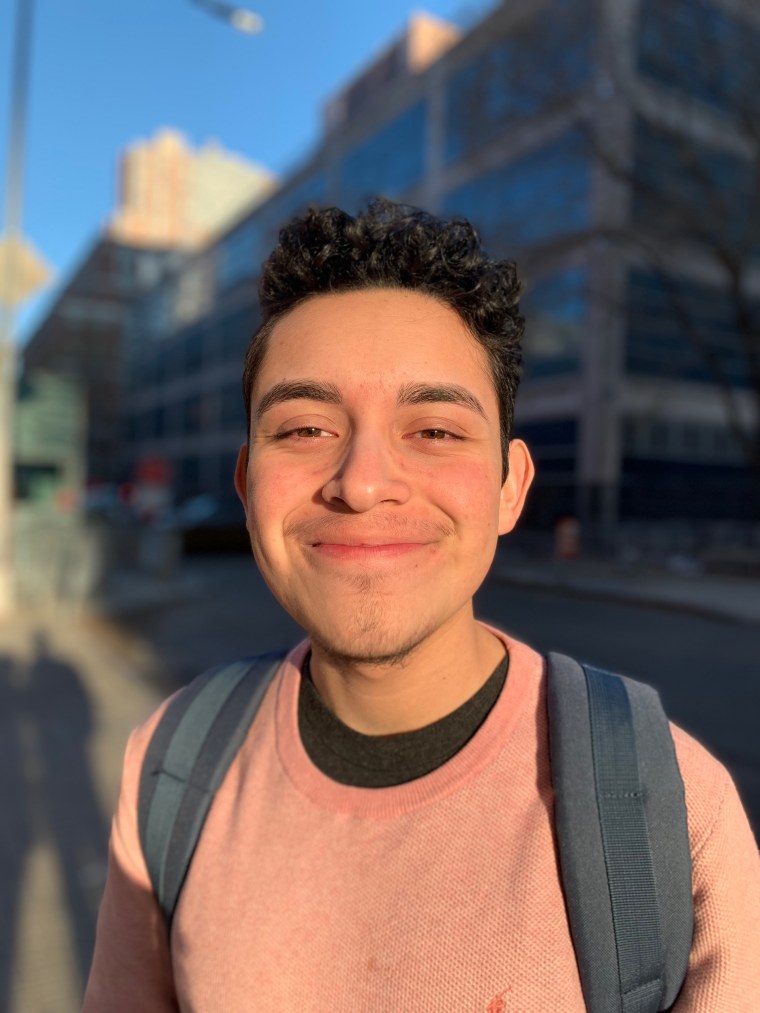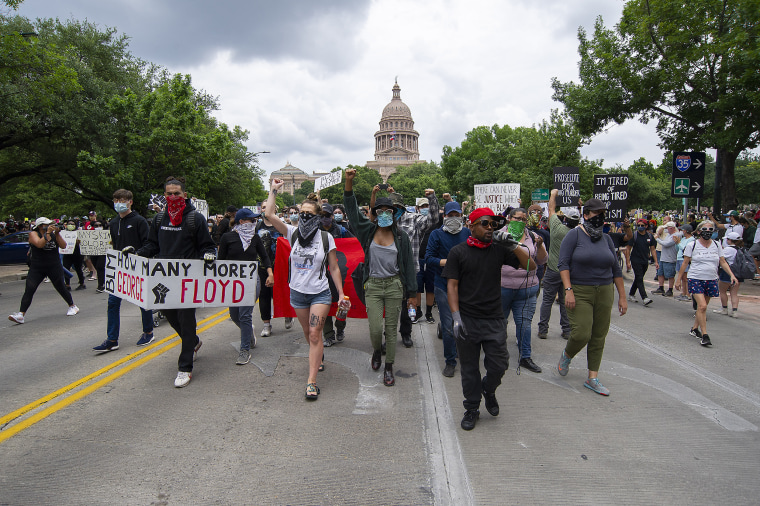AUSTIN, Texas — Home from his studies at New York University, Austin Barrón, 20, ventured out here recently to join protests against the death of George Floyd, carrying with him what he said is the full weight that comes with being Latino. But he had his mind on the black community.
Many minorities face struggle, said Barrón, the son of immigrants from Mexico, but he said he set those aside and focused on the many African Americans who have died in confrontations with police.
“That’s what I was there for,” Barrón said of his day of protesting at the Texas Capitol and City Hall, before he and other protesters fled when police began firing rubber bullets. “If we can push their success forward and if we can push their lives forward, it will help us.”

For many Americans, Floyd’s death after a Minneapolis police officer pressed his knee on his neck for 8 minutes and 46 seconds was a breaking point.
But the national protests that have followed resonate with Latinos like Barrón, not just as an act of solidarity, but because of the ways police tactics and law enforcement have been used against Latinos — from laws that give police the authority to question a person’s citizenship and authorization to be in the country to deadly shootings in police actions.
“Being a Latino and having the experience where I see people both in my community and on the news all the time being hurt and being abused by a police officer, there doesn’t seem to be any accountability," Barrón said.
"You don’t need to be black to see how horrible it is,” he said. “With more police accountability, that will help us, too.”
In Austin, the protests were also billed as demonstrations against the April 24 police shooting death of Mike Ramos, described as African American and Latino. Police are investigating the officer, Christopher Taylor, who shot Ramos.
According to reports, police responded to a 911 call of people doing drugs in a car and that one of the people had a gun. Police said Ramos, 42, got out of the car but did not comply with officers’ commands. One officer fired at Ramos with a bean-bag rifle, prompting Ramos to get back in the car and start to drive away, The Austin American-Statesman reported.
According to reports, Taylor then fired at the car, killing Ramos. Police said no gun was found in the car.
At a news conference Sunday, Ramos' mother, Brenda Ramos, said: “I cry every day. Now I’m in this terrible, heartbreaking club. It’s a club of mothers of black Americans who have been murdered by police."
In a April 25 online news conference after Ramos' death, Angelica Erazo, vice chair of Austin’s Hispanic Quality of Life Commission, called on the Latino community to “not leave all the heavy lifting to the black community.”
“All too often, we do not show up when it comes to police violence and your voice is powerful and needed, too,” Erazo said.
Remembering Anthony Baez, stop-and-frisk
Following the killing of George Floyd, Juan Cartagena, president and general counsel of the national Latino legal civil rights organization, LatinoJustice PRLDEF, asked Latinos who have lost loved ones at the hands of police to “unequivocally say, Black lives matter!”
Cartagena, in a statement, pointed to the 1994 case of Anthony Baez, a 29-year-old security guard who died after a New York City police officer, Francis Livoti, put him in a chokehold while trying to arrest him and his brother outside their family home.
A New York state judge acquitted Livoti, who had other police brutality complaints against him. But the Justice Department won a civil rights conviction against Livoti, who was then sentenced to seven years in prison. Baez's mother's fight for justice, along with two other mothers on behalf of their children, was the subject of the film "Every Mother's Son."
In New York City, black men and Latinos, including many who identify as Afro-Latino, were caught up in the contentious stop-and-frisk policing practice that essentially sanctioned racial profiling as an anti-crime tactic.
The operation recently catapulted back into the news as former New York City Mayor Mike Bloomberg waged his presidential campaign and sought to enlist black and Latino support. An analysis from the New York Civil Liberties Unionfound that in 2011, when Bloomberg was mayor, more than 685,000 people had been stopped and frisked, most of them black or Latino — and nearly 9 in 10 were innocent.
Cartagena said that the video of Floyd’s arrest struck a chord with Latinos and others who have been following and seeing police abuse for decades.
“If you ever found a more perfect convergence of shared interest among Muslims, LGBTQ, black people, Latino people, everybody was clearly unified against the practices of stop and frisk,” Cartagena said.
When police enforce immigration
Often Latinos are seen only through the lens of immigration. But many have decried the increasing way they are criminalized under the guise of immigration enforcement.
In the aftermath of Floyd’s death, Texas Gov. Greg Abbott said in a statement that Texas and America mourn George Floyd “and the actions that led to his death are reprehensible and should be condemned in the strongest terms possible.”
Rep. Joaquín Castro, D-Texas, chairman of the Congressional Hispanic Caucus, called out the governor in a tweet as “part of the problem” and reminded Abbott that he “enacted — SB4 — that encourages racial profiling by law enforcement.”
The Texas law, SB4, was billed as a means to ensure that cities and communities cooperate with immigration officers, preventing so-called sanctuary cities. The law allows police to question the citizenship and immigration status of anyone they arrest, detain or stop, even on minor traffic stops. It allows the removal — and jail time — of any city police chief, sheriff or other official in charge if they prevent their officers or employees from cooperating with federal immigration officials.
Laws like SB4 are seen as adding to the tension and problems between police and minority communities. Through agreements with the federal government, law enforcement in certain cities and counties help Immigration and Customs Enforcement arrest and detain people; it also contributes to racial profiling, as was the case with a contentious Arizona law, SB1070.
“We must remember that the videotaping of this horrific incident shows yet a tiny fraction of the police brutality confronted every day by people of color,” Castro said of the Floyd video in a statement on behalf of the Congressional Hispanic Caucus. “The anger and pain we see on the streets of Minnesota and all across America are the loud voices of people long silenced.”
Rep. Jesús "Chuy" García, D-Ill., added his support to a resolution condemning police brutality that was drafted by Democratic Rep. Ayanna Pressley of Massachusetts and others, as well as the Congressional Black Caucus.
At the same time, García reiterated the need to enact legislation introduced by Democratic colleagues against police chokeholds, the use of secretive internal reviews of police misconduct and an end to qualified immunity for police, which means they can't be sued in a court of law.
"Now is the time to stand in solidarity with our Black sisters and brothers and realize that their struggle is our struggle," said García in a statement. "Our stories are intertwined, and it is up to us to write our future legacy."
Roberto Cintli Rodriguez, an associate professor of Mexican American studies at the University of Arizona, told NBC News there is a serious undercount of Latinos who have been victims of police violence because many police departments register Latino victims as white or unknown. He has culled such categories and found Latino victims.
He's been documenting cases of police brutality against black, Latino and Native American people ever since he became a victim himself.
Rodriguez said that as a photographer for Lowrider magazine, he was shooting photos of police beating a man when authorities turned on him and fractured his skull.
Rodriguez compiled essays by him and by families of the victims of such violence in his book, "Yolqui, A Warrior Summoned From the Spirit World: Testimonies on Violence."
One of the most prominent Latinos pressing for police reforms is Julián Castro, Joaquín's brother and a former 2020 Democratic presidential candidate, who pushed the issue to the forefront on the campaign trail with a stand-alone police overhaul plan.
Castro would recite the names of largely black victims of police violence but also some Latinos, including Antonio Arce. Arce was 14 when he was shot by a Tempe, Arizona, police officer in January 2019 while running away with an airsoft gun. Joe Biden, the apparent Democrat presidential nominee, recently called out Castro to help him tackle overhauling police practices in the wake of Floyd's death.
“When things like this happen," said Maya Rupert, who was Castro’s former campaign manager, the only black campaign manager in the 2020 presidential election cycle, "if there is no one saying I have a plan to make this better, what are people hoping for? What can end this?"
For Barrón, joining the protests was part of the solution. Police violence and brutality could be hidden in the past, but his generation is now seeing it and documenting it, he said.
"We've grown up with a deep rumble of anxiety with all these issues, gun violence, police brutality and climate change," Barrón said. "We are tired of it and we want change. We are finally coming to a point in our lives where we can push for that change."
Follow NBC Latino on Facebook, Twitter and Instagram.


